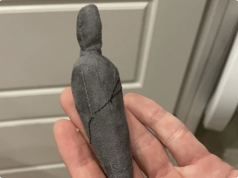In recent decades, cremation has become a common choice for end-of-life care—driven by practical concerns like cost, land use, and environmental impact. But for many Christians, a pressing question remains: Is cremation a sin according to the Bible?
With rising trends in cremation rates across the Western world, believers are seeking clarity on whether this practice aligns with their faith—or if it contradicts biblical principles.
Let’s explore what Scripture actually says—and doesn’t say—about cremation, burial, and the Christian hope beyond death.
What the Bible Says About Cremation: Silence Speaks Volumes
Here’s the key truth:
👉 The Bible does not explicitly condemn or forbid cremation.
There is no verse that says, “Thou shalt not burn the dead,” nor any direct commandment against reducing a body to ashes. Unlike dietary laws or moral instructions, cremation isn’t addressed as a prohibited act in Scripture.
This absence of a clear prohibition is significant. If God had deemed cremation sinful, one might expect a clear warning—especially given how seriously the Bible treats matters of life, death, and holiness.
Burial Was the Norm—But Not the Rule
While cremation isn’t forbidden, burial was the dominant practice in biblical times.
- Abraham bought a cave to bury Sarah (Genesis 23).
- Jesus was laid in a tomb after His crucifixion (John 19:41–42).
- Early Christians buried their dead, reflecting Jewish tradition and respect for the body.
Because of this consistent pattern, burial has long symbolized Christian hope in resurrection—the belief that just as Christ rose from the grave, so too will believers be raised to eternal life (1 Corinthians 15:42–44).
This powerful imagery has led many churches to favor burial as a testimony of faith in bodily resurrection.
Cremation in Biblical Context: Judgment, Not Worship
Interestingly, fire does appear in Scripture—but usually in connection with judgment, not reverence.
For example:
- Achan and his family were burned after being stoned for disobedience (Joshua 7:25).
- Certain Canaanite kings were executed and burned (Joshua 11:9).
These instances reflect divine judgment—not funeral rites. There’s no record of faithful Israelites being cremated as part of worship or honor.
However, these examples don’t equate modern cremation with punishment. The context is entirely different: ancient executions vs. today’s dignified, respectful practices.
The Body as a Temple: Does Cremation Dishonor It?
Some Christians object to cremation based on passages like:
“Do you not know that your bodies are temples of the Holy Spirit?”
—1 Corinthians 6:19
They argue that burning the body disrespects its sacredness.
But here’s an important distinction:
This verse speaks about how we treat our bodies during life—through purity, health, and holiness—not what happens after death. The “temple” language emphasizes stewardship while living, not preservation after death.
Moreover, God is fully capable of resurrecting anyone—regardless of condition.
Whether a body decays naturally, is lost at sea, destroyed in war, or turned to ash, nothing limits God’s power to raise the dead.
“The dust returns to the ground it came from, and the spirit returns to God who gave it.”
—Ecclesiastes 12:7
Our hope isn’t in the preservation of flesh, but in the promise of new life.
Cultural Roots and Misconceptions
Historically, cremation was associated with pagan religions—particularly in cultures that denied bodily resurrection (like ancient Greece and Rome). This association made early Christians reject it as contrary to their beliefs.
But intent matters. Today, most people choose cremation for reasons unrelated to theology:
- Cost savings
- Simplicity
- Environmental concerns
- Mobility (scattering ashes where meaningful)
These motivations are far removed from ancient idolatry.
Modern Christian Perspectives: Unity in Hope
Today, most major Christian denominations—including Catholics, Anglicans, Evangelicals, and many Protestants—accept cremation, provided it’s done with reverence and not as a denial of resurrection.
The Catholic Church lifted its ban on cremation in 1963 and now permits it, as long as ashes are treated with dignity (e.g., kept in a sacred place, not scattered casually).
Similarly, many Protestant leaders emphasize that salvation depends on Christ—not caskets or crematoriums.
As theologian R.C. Sproul once said:
“If God can create humanity from dust, He can certainly resurrect someone from ashes.”
So, Is Cremation a Sin? The Answer
No—cremation is not a sin according to the Bible.
There is no scriptural basis for condemning it as inherently immoral or unchristian. While burial carries deep symbolic value and historical continuity, cremation does not diminish God’s ability to resurrect the believer.
What is important:
- Honoring the body as God’s creation
- Approaching death with reverence and faith
- Holding fast to the hope of resurrection through Jesus Christ
Final Thoughts: Peace in the Midst of Grief
Grief is hard enough without adding guilt over burial choices. For Christians, the central truth isn’t how we’re laid to rest—but in Whom we place our hope.
Whether buried in soil or released as ash, the believer’s body belongs to God. And on the last day, He will call us forth—not because of the method of our departure, but because of the sacrifice of His Son.
So if you’re facing this decision for yourself or a loved one, remember:
➡️ Your faith isn’t measured by fire or earth.
➡️ Your eternity isn’t determined by a casket or an urn.
➡️ Your resurrection rests on Christ alone.
And that’s a truth worth holding onto—long after the final breath.










